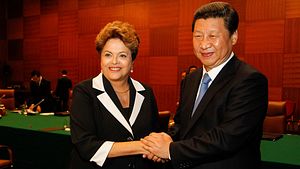Xi Jinping is seeking to boost ties with Brazil with a state visit to the country this week.
While in the country for the BRICS summit, Xi is making a state visit to Brazil where he will meet with Brazilian President Dilma Rousseff. This is Xi’s first visit to Brazil since becoming president (he visited the country as vice president in 2009), and comes as China and Brazil celebrate their 40th anniversary of bilateral ties.
Before leaving for Brazil, Xi stated in a written interview that he attaches “great importance to growing the global strategic partnership with Brazil” and believes “China is ready to work with Brazil under the principle of mutual benefit to promote sustained two-way trade.” He explained that during his trip, he and Brazilian leaders will be discussing to further strengthen exchanges and cooperation in all aspects of Sino-Brazilian relations.
Xi reiterated his goal of improving China-Brazil relations shortly after landing in the country, when he told reporters that he is “looking forward to conducting wide exchanges with Brazilian leaders and people from all walks of life, focusing on common development, boosting practical cooperation and accelerating the development of China-Brazil comprehensive strategic partnership.”
One of Xi’s goals this week will be to find new opportunities to boost China’s investment in Brazil’s infrastructure. Modernizing Brazil’s transportation and energy infrastructure presents a win-win scenario for Brazil and China. Indeed, modernizing infrastructure will substantially reduce the transportation costs, which will benefit Brazil’s entire economy even as it makes it a more profitable trade partner for China. Beijing also has deep expertise in this area owing to its own development as well as its efforts in other parts of the world like Africa.
On other hand, Brazil will use Xi’s state visit to try and reduce its trade imbalance with China. In 2012, Brazil imported almost $19 billion more from China then Beijing imported from Brasilia. Brazil will also use Xi’s trip this week to try and rebalance its exports to China away from raw materials, like soybeans and iron ores, and towards more manufactured goods. Brazil is trying to move its economy up the value chain and breaking into the Chinese market will be essential for achieving this goal.
Bilateral ties between China and Brazil have increased substantially in recent years, going above and beyond their joint membership in the BRICS bloc. In 2012, China and Brazil agreed to establish a comprehensive strategic partnership, and bilateral trade topped $80 billion last year. As a result, China surpassed the United States as Brazil’s top trading partner back in 2009, and Brazil is currently China’s 9th largest trading partner. In another sign of their intentions to boost bilateral trade, Brazil and China signed a $30 billion currency swap last year.
Kelwin Choi is an editorial assistant at The Diplomat.

































